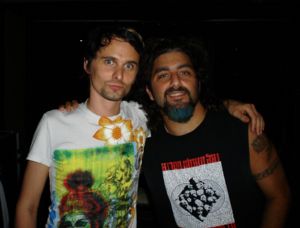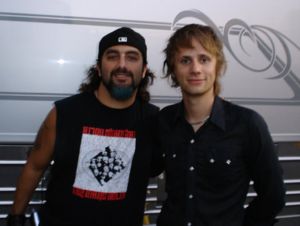Difference between revisions of "Dream Theater"
| (3 intermediate revisions by the same user not shown) | |||
| Line 1: | Line 1: | ||
[[Image:Mike Portnoy and Bellamy.jpg|thumb|right|Mike Portnoy and Bellamy]] | [[Image:Mike Portnoy and Bellamy.jpg|thumb|right|Mike Portnoy and Bellamy]] | ||
[[Image:Mike Portnoy and Howard.jpg|thumb|right|Portnoy and Howard]] | |||
'''Dream Theater''' is an American progressive metal band formed in 1985. It is now composed of [[John Petrucci]] on guitar, John Myung on bass, Jordan Rudess on keyboard and James LaBrie as vocalist. In 2010, Mike Portnoy left his position as drummer of the band and was replaced by Mike Mangini. | '''Dream Theater''' is an American progressive metal band formed in 1985. It is now composed of [[John Petrucci]] on guitar, John Myung on bass, Jordan Rudess on keyboard and James LaBrie as vocalist. In 2010, Mike Portnoy left his position as drummer of the band and was replaced by Mike Mangini. Both Mike Portnoy and John Petrucci have mentioned that the band are influenced by Muse amongst other acts (such as Rush) both in terms of live shows and musical arrangements. | ||
==Muse influence== | ==Muse influence== | ||
Mike Portnoy wrote a list of his 10 favourite albums released in 2004 in which he included [[Absolution (album)|Absolution]] as the first on the list. Next to it, he wrote "(technically this is a 2003 release - but it is hands down my favorite CD of the year and probably the decade as well!)".<ref>[http://www.dreamtheater.net/archive_portnoy.php?y=2004#2004top10 dreamtheater.net Mike Portnoy's Top 10's of 2004]</ref> | Mike Portnoy wrote a list of his 10 favourite albums released in 2004 in which he included [[Absolution (album)|Absolution]] as the first on the list. Next to it, he wrote "(technically this is a 2003 release - but it is hands down my favorite CD of the year and probably the decade as well!)".<ref>[http://www.dreamtheater.net/archive_portnoy.php?y=2004#2004top10 dreamtheater.net Mike Portnoy's Top 10's of 2004]</ref> | ||
Dream Theater have | In 2005, the band released an album called "Octavarium" on which some songs ("These walls" and "Never Enough") have a strong Muse influence (Never Enough having a very similar riffs to [[Hysteria (song)|Hysteria]] and [[Stockholm Syndrome (song)|Stockholm Syndrome]]) - with [[Assassin (song)|Assassin]]'s drum beat later possibly being influenced by Panic Attack off of the same album and [[Knights of Cydonia (song)|Knights of Cydonia]]'s very final riff probably paying homage to Dream Theater's song "In the name of God" off of their 2003 album "Train of Thought". | ||
In 2007, they released "Systematic Chaos", with "Prophets of War" again resembling [[Stockholm Syndrome (song)|Stockholm Syndrome]]. | |||
Dream Theater have, at least once, covered [[Stockholm Syndrome (song)|Stockholm Syndrome]] live, as an instrumental outro. A clip of this can be seen [http://uk.youtube.com/watch?v=yH9V5ea9jNY here]. | |||
Mike Portnoy also said in ''Muse-IN'', a French fanzine about the band edited by [[French official Fan Club|Muse Messenger]] in February 2006 the following about Muse: "Well, I didn't hide that '''Muse''' is one of the bands which impressed me the most these last years. Inevitably, when we listen to bands during composition time, it could arise in a realtively conscious way, because that's a part of us at this moment. Sometimes people insult us while violently reproaching us for having influences, but when we're a music lover, we are inspired by things we love, anyway." | Mike Portnoy also said in ''Muse-IN'', a French fanzine about the band edited by [[French official Fan Club|Muse Messenger]] in February 2006 the following about Muse: "Well, I didn't hide that '''Muse''' is one of the bands which impressed me the most these last years. Inevitably, when we listen to bands during composition time, it could arise in a realtively conscious way, because that's a part of us at this moment. Sometimes people insult us while violently reproaching us for having influences, but when we're a music lover, we are inspired by things we love, anyway." | ||
Latest revision as of 04:13, 25 June 2019
Dream Theater is an American progressive metal band formed in 1985. It is now composed of John Petrucci on guitar, John Myung on bass, Jordan Rudess on keyboard and James LaBrie as vocalist. In 2010, Mike Portnoy left his position as drummer of the band and was replaced by Mike Mangini. Both Mike Portnoy and John Petrucci have mentioned that the band are influenced by Muse amongst other acts (such as Rush) both in terms of live shows and musical arrangements.
Muse influence
Mike Portnoy wrote a list of his 10 favourite albums released in 2004 in which he included Absolution as the first on the list. Next to it, he wrote "(technically this is a 2003 release - but it is hands down my favorite CD of the year and probably the decade as well!)".[1]
In 2005, the band released an album called "Octavarium" on which some songs ("These walls" and "Never Enough") have a strong Muse influence (Never Enough having a very similar riffs to Hysteria and Stockholm Syndrome) - with Assassin's drum beat later possibly being influenced by Panic Attack off of the same album and Knights of Cydonia's very final riff probably paying homage to Dream Theater's song "In the name of God" off of their 2003 album "Train of Thought".
In 2007, they released "Systematic Chaos", with "Prophets of War" again resembling Stockholm Syndrome.
Dream Theater have, at least once, covered Stockholm Syndrome live, as an instrumental outro. A clip of this can be seen here.
Mike Portnoy also said in Muse-IN, a French fanzine about the band edited by Muse Messenger in February 2006 the following about Muse: "Well, I didn't hide that Muse is one of the bands which impressed me the most these last years. Inevitably, when we listen to bands during composition time, it could arise in a realtively conscious way, because that's a part of us at this moment. Sometimes people insult us while violently reproaching us for having influences, but when we're a music lover, we are inspired by things we love, anyway."
References
See also
Back to Influences

